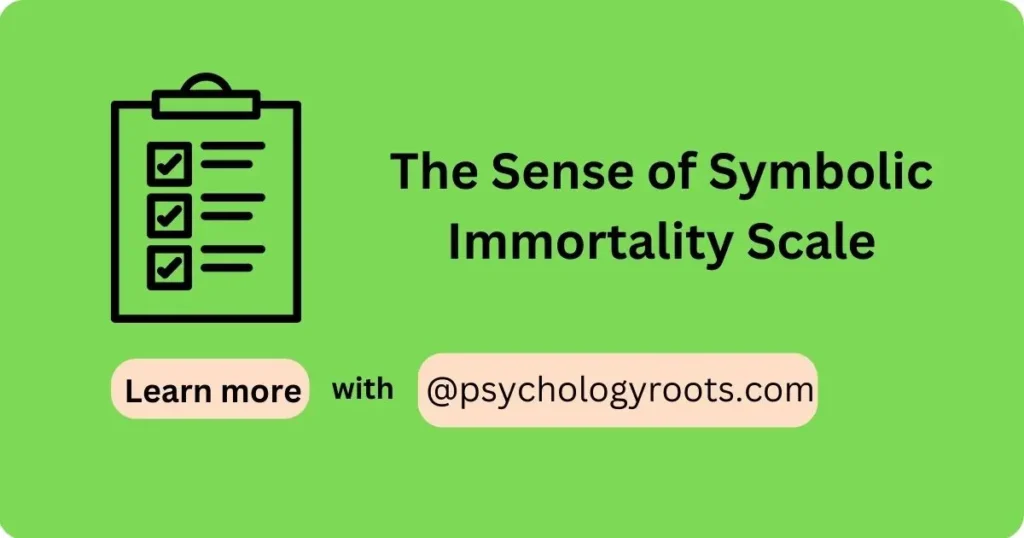Table of Contents
The Sense of Symbolic Immortality Scale
Here in this post, we are sharing the “Sense of Symbolic Immortality Scale”. You can read psychometric and Author information. We have thousands of Scales and questionnaires in our collection (See Scales and Questionnaires). You can demand us any scale and questionnaires related to psychology through our community, and we will provide you with a short time. Keep visiting Psychology Roots.
About Scale Name
Scale Name
The Sense of Symbolic Immortality Scale
Author Details
Dr. Jean-Louis Drolet
Translation Availability
Not Sure

Background/Description
The Sense of Symbolic Immortality Scale (SSIS) is a psychological test developed by Dr. Jean-Louis Drolet of the Université Laval in Quebec, Canada. The SSIS was first published in 1990 and is designed to measure an individual’s sense of symbolic immortality, which is the belief that one’s life has meaning and purpose beyond physical death. The SSIS consists of a series of statements to which the individual responds by circling a number from 1 to 7, with 1 indicating strong disagreement and 7 indicating strong agreement.
Drolet’s research suggests that a sense of symbolic immortality is something that individuals acquire as they grow older and accumulate experience. People in their forties have significantly higher scores on the SSIS than students in their teens and early twenties. The SSIS measures five modes of experiencing our connection with the world, also called modes of symbolic immortality, that can generate vitalizing images. The first mode is the biological mode, which is the sense of continuity we have with our ancestors and descendants.
The second mode is the creative mode, which is the sense of continuity we have with our creative works. The third mode is the experiential mode, which is the sense of continuity we have with our peak experiences. The fourth mode is the relational mode, which is the sense of continuity we have with our loved ones. The fifth mode is the spiritual mode, which is the sense of continuity we have with something greater than ourselves.
Administration, Scoring and Interpretation
The Sense of Symbolic Immortality Scale (SSIS) by Dr. Jean-Louis Drolet is administered by asking the respondent to indicate their level of agreement or disagreement with a series of statements on a scale of 1 to 7. The scale is designed to measure an individual’s sense of symbolic immortality, which is the belief that one’s life has meaning and will continue to have an impact after death. The SSIS is available for use in research and clinical settings.
The score for the following items must be reversed (7 = 1, 6 = 2, 5 = 3, etc.): 3, 4, 5, 6, 11, 12, 14, 17, 19, 23, and 26. After reversing the designated items, add to find your total score.
Reliability and Validity
The Sense of Symbolic Immortality Scale (SSIS) by Dr. Jean-Louis Drolet has been shown to have good reliability and validity.
Available Versions
26-Items
Reference
Drolet, J. L. (1990). Transcending Death During Early Adulthood: Symbolic Immortality, Death Anxiety, and Purpose in Life. Journal of Clinical Psychology, 46, 148–160.
Important Link
Scale File:
Frequently Asked Questions
Q: What is the Sense of Symbolic Immortality Scale?
A: The Sense of Symbolic Immortality Scale (SSIS) is a psychological test designed by Dr. Jean-Louis Drolet to measure an individual’s sense of symbolic immortality, which is the belief that one’s life has meaning and purpose beyond physical death.
Q: Who developed the SSIS?
A: The SSIS was developed by Dr. Jean-Louis Drolet, who is affiliated with the Université Laval in Quebec, Canada.
Q: What are the five modes of experiencing connection with the world according to the SSIS?
A: The five modes of experiencing connection with the world, also called modes of symbolic immortality, that can generate vitalizing images are: biological mode, creative mode, experiential mode, relational mode, and spiritual mode.
Q: How is the SSIS administered?
A: The SSIS is administered by asking the respondent to indicate their level of agreement or disagreement with a series of statements on a scale of 1 to 7.
Q: What is the reliability and validity of the SSIS?
A: The SSIS has been shown to have good reliability and validity.
Q: Is there more than one version of the SSIS available?
A: Currently, only the 26-item version of the SSIS is available.
Q: Where can I find a reference for the SSIS?
A: The reference for the SSIS is: Drolet, J. L. (1990). Transcending Death During Early Adulthood: Symbolic Immortality, Death Anxiety, and Purpose in Life. Journal of Clinical Psychology, 46, 148–160.
Disclaimer
Please note that Psychology Roots does not have the right to grant permission for the use of any psychological scales or assessments listed on its website. To use any scale or assessment, you must obtain permission directly from the author or translator of the tool. Psychology Roots provides information about various tools and their administration procedures, but it is your responsibility to obtain proper permissions before using any scale or assessment. If you need further information about an author’s contact details, please submit a query to the Psychology Roots team.
Help Us Improve This Article
Have you discovered an inaccuracy? We put out great effort to give accurate and scientifically trustworthy information to our readers. Please notify us if you discover any typographical or grammatical errors.
Make a comment. We acknowledge and appreciate your efforts.
Share With Us
If you have any scale or any material related to psychology kindly share it with us at psychologyroots@gmail.com. We help others on behalf of you.